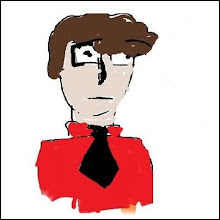In the 2003 film, directed by Edward Zwick, the American protagonist (Nathan Algren) travels to Japan and is enlisted as an advisor to the Imperial government. They require his help to destroy the last hold outs of the old ways, who do not wish to surrender their traditional lifestyles. They "no longer dishonor themselves with the use of firearms," he is told.
The main character ends up joining the samurai and fighting alongside them. We are to believe their cause is noble and pure. In fact, the samurai were noblemen in a strict feudal system who lived off of a stipend from the rulers. The overwhelming majority of the population did the labor required for society to function and enjoyed little privileges in return. The samurai heroes apparently want to hold onto this system, to keep their government stipend and all expenses paid living arrangements. Given solely the context of the film, the samurai are unequivocally the bad guys.
The Japanese film of the same name, although dealing with the same time period, is much more nuanced. The films's title character, Sugi, starts out seemingly as the standard samurai hero, a stoic, lone wolf killing machine. Throughout the film he is humanized more and more, for example we learn of a childhood suicide attempt, his father/son like relationship with his sensei and so on. This happens with the Meiji Restoration as it's backdrop. When the Shogun's forces are defeated, Sugi's sensei, killed in the struggle, makes him promise to not avenge his death.
The film's other characters, all connected to Sugi with one night of drinking in which they bonded, remain attached to one faction or another and refuse to quit fighting.
Misumi's Last Samurai shows the samurai for what they were, a violent pre-modern culture. It also clearly illustrates that the conflicts of the time period, in contrast to the impression the 2003 films gives, owed just as much to the struggle between the Tokugawa Shogunate (as well as it's holdouts) and the Imperial Government, than modernism versus tradition.
So, why are modern people fascinated with pre-modern warrior cultures? From the Spartans in 300, the samurai in The Last Samurai to the Vikings of Scandinavia, warrior cultures make for great fiction. But there is more to it than that. Hitler claimed that Sparta was the ideal state. In Sparta, after all, a pampered warrior class went about conquering and warring on it's neighbors while the labor to make society function was done by a massive slave population. Sparta had a slave to free citizen ration of 10 to 1. Nazi Germany infamously used millions of slaves to support it's war machine, which they sent out in self defense of Western Civilization from Jewish Bolshevism.
Taking the movie 300 as an example, the Spartans ask their fellow Greeks what their professions are. They list mundane jobs in Ancient Greece. The Spartans reply that they are soldiers. The reason so many Spartans are free to devote themselves fully to studying war is because all the labor in their city-state is done by slaves. The Persian Empire is arguably more free than Sparta, so ultimately the war comes down to Western Civilization versus Eastern Civilization, not free versus oppressive societies. Seeing themselves as defenders of Western Civilization is common verbiage among far right groups and fascists in Europe and America.
It's not a coincidence that Norwegian fascists and the Imperial Japanese steeped themselves in Viking and Samurai verbiage. Nationalist groups, including the far right and fascists, subscribe to a pre-modern world view where doing good is helping the nation and doing bad is helping the nation's enemies. And of course adoration of soldiers and war is common among nationalist, far right and fascist groups as well. Taken together, these pre-modern warrior cultures are tailor made to provide these deplorable groups with inspiration.
I'm not saying there is anything wrong with enjoying fiction from these time periods. In fact, many samurai movies are actually anti-samurai, where the characters are social outcasts challenging the strict hierarchy of the era. Compare the samurai, fighting for tradition over modernism, from Zwick's Last Samurai to Zatoichi, the star of the longest running film series of all time. Zatoichi, although a sword wielding warrior, is not even a samurai. As a blind peasant he falls near the bottom of the established order. His opponents are often corrupt samurai and yakuza preying on the lower classes. "There is nothing worse than a samurai," Zatoichi remarks in one of his many films.
What a person should ponder when seeing celebrations of these violent cultures is who is creating this? What are they trying to say? What is invested in seeing these people as heroes? Again I'm not subscribing ulterior motives to Zwick's Last Samurai or 300, only attempting to point out where the lines of thought they bring can lead people. The truth is, in history there are few heroes, and often those attempting to make heroes out of villains reveal themselves as modern day villains.

No comments:
Post a Comment